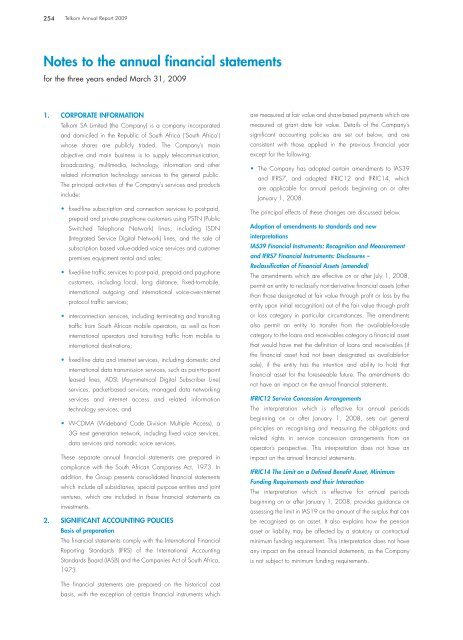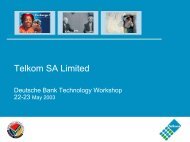Telkom AR front.qxp
Telkom AR front.qxp
Telkom AR front.qxp
Create successful ePaper yourself
Turn your PDF publications into a flip-book with our unique Google optimized e-Paper software.
254<br />
<strong>Telkom</strong> Annual Report 2009<br />
Notes to the annual financial statements<br />
for the three years ended March 31, 2009<br />
1. CORPORATE INFORMATION<br />
<strong>Telkom</strong> SA Limited (the Company) is a company incorporated<br />
and domiciled in the Republic of South Africa (’South Africa’)<br />
whose shares are publicly traded. The Company’s main<br />
objective and main business is to supply telecommunication,<br />
broadcasting, multimedia, technology, information and other<br />
related information technology services to the general public.<br />
The principal activities of the Company’s services and products<br />
include:<br />
• fixed-line subscription and connection services to post-paid,<br />
prepaid and private payphone customers using PSTN (Public<br />
Switched Telephone Network) lines, including ISDN<br />
(Integrated Service Digital Network) lines, and the sale of<br />
subscription based value-added voice services and customer<br />
premises equipment rental and sales;<br />
• fixed-line traffic services to post-paid, prepaid and payphone<br />
customers, including local, long distance, fixed-to-mobile,<br />
international outgoing and international voice-over-internet<br />
protocol traffic services;<br />
• interconnection services, including terminating and transiting<br />
traffic from South African mobile operators, as well as from<br />
international operators and transiting traffic from mobile to<br />
international destinations;<br />
• fixed-line data and internet services, including domestic and<br />
international data transmission services, such as point-to-point<br />
leased lines, ADSL (Asymmetrical Digital Subscriber Line)<br />
services, packet-based services, managed data networking<br />
services and internet access and related information<br />
technology services; and<br />
• W-CDMA (Wideband Code Division Multiple Access), a<br />
3G next generation network, including fixed voice services,<br />
data services and nomadic voice services.<br />
These separate annual financial statements are prepared in<br />
compliance with the South African Companies Act, 1973. In<br />
addition, the Group presents consolidated financial statements<br />
which include all subsidiaries, special purpose entities and joint<br />
ventures, which are included in these financial statements as<br />
investments.<br />
2. SIGNIFICANT ACCOUNTING POLICIES<br />
Basis of preparation<br />
The financial statements comply with the International Financial<br />
Reporting Standards (IFRS) of the International Accounting<br />
Standards Board (IASB) and the Companies Act of South Africa,<br />
1973.<br />
The financial statements are prepared on the historical cost<br />
basis, with the exception of certain financial instruments which<br />
are measured at fair value and share-based payments which are<br />
measured at grant date fair value. Details of the Company’s<br />
significant accounting policies are set out below, and are<br />
consistent with those applied in the previous financial year<br />
except for the following:<br />
• The Company has adopted certain amendments to IAS39<br />
and IFRS7, and adopted IFRIC12 and IFRIC14, which<br />
are applicable for annual periods beginning on or after<br />
January 1, 2008.<br />
The principal effects of these changes are discussed below.<br />
Adoption of amendments to standards and new<br />
interpretations<br />
IAS39 Financial Instruments: Recognition and Measurement<br />
and IFRS7 Financial Instruments: Disclosures –<br />
Reclassification of Financial Assets (amended)<br />
The amendments which are effective on or after July 1, 2008,<br />
permit an entity to reclassify non-derivative financial assets (other<br />
than those designated at fair value through profit or loss by the<br />
entity upon initial recognition) out of the fair value through profit<br />
or loss category in particular circumstances. The amendments<br />
also permit an entity to transfer from the available-for-sale<br />
category to the loans and receivables category a financial asset<br />
that would have met the definition of loans and receivables (if<br />
the financial asset had not been designated as available-forsale),<br />
if the entity has the intention and ability to hold that<br />
financial asset for the foreseeable future. The amendments do<br />
not have an impact on the annual financial statements.<br />
IFRIC12 Service Concession Arrangements<br />
The interpretation which is effective for annual periods<br />
beginning on or after January 1, 2008, sets out general<br />
principles on recognising and measuring the obligations and<br />
related rights in service concession arrangements from an<br />
operator’s perspective. This interpretation does not have an<br />
impact on the annual financial statements.<br />
IFRIC14 The Limit on a Defined Benefit Asset, Minimum<br />
Funding Requirements and their Interaction<br />
The interpretation which is effective for annual periods<br />
beginning on or after January 1, 2008, provides guidance on<br />
assessing the limit in IAS19 on the amount of the surplus that can<br />
be recognised as an asset. It also explains how the pension<br />
asset or liability may be affected by a statutory or contractual<br />
minimum funding requirement. This interpretation does not have<br />
any impact on the annual financial statements, as the Company<br />
is not subject to minimum funding requirements.




